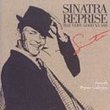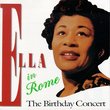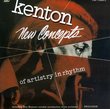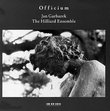| All Artists: Arnold Schoenberg, BBC Symphony Orchestra, Pierre Boulez, Marita Napier, Siegmund Nimsgern, Jess Thomas, Yvonne Minton, BBC Singers, Gentlemen of the London Philharmonic Choir, BBC Choral Society Title: Schoenberg - Gurre-Leider ~ 4 Songs, Op. 22 / Napier, Minton, Nimsgern, J. Thomas, BBC SO, Boulez Members Wishing: 0 Total Copies: 0 Label: Sony Release Date: 7/13/1993 Genres: Pop, Classical Styles: Vocal Pop, Opera & Classical Vocal Number of Discs: 2 SwapaCD Credits: 2 UPC: 074644845921 |
Search - Arnold Schoenberg, BBC Symphony Orchestra, Pierre Boulez :: Schoenberg - Gurre-Leider ~ 4 Songs, Op. 22 / Napier, Minton, Nimsgern, J. Thomas, BBC SO, Boulez
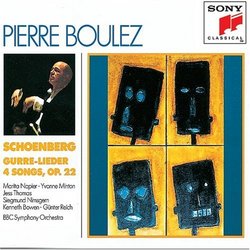 | Arnold Schoenberg, BBC Symphony Orchestra, Pierre Boulez Schoenberg - Gurre-Leider ~ 4 Songs, Op. 22 / Napier, Minton, Nimsgern, J. Thomas, BBC SO, Boulez Genres: Pop, Classical
|
Larger Image |
CD DetailsSimilarly Requested CDs |
CD ReviewsA performance with some major problems Robert S. Costic | 06/19/2006 (3 out of 5 stars) "As a general rule I'm a big fan of Boulez's recordings of modern works, but I have one major problem with this work. When a conductor has a work with a very large orchestra the conductor has to be particularly careful about making sure that the sounds stay distinct; otherwise the individual instruments are going to get lost in the large sound of the orchestra as a whole. The sound here sounds great at the softer moments of the work, but there are critical moments that are botched. For example, the sounds in the hunting song for male choruses are very uneven. And the finale for dawn is a total mess; the sounds disappear into one, loud blaring noise. I've heard recordings that have handled these forces much better." A GREAT GURRELIEDER; AN EXQUISITE FOUR SONGS... Sébastien Melmoth | Hôtel d'Alsace, PARIS | 01/08/2006 (5 out of 5 stars) ". Boulez is the world's greatest living conductor (followed by Abbado and Gergiev). Boulez is an expert in Bruckner, Mahler, and Schoenberg, and this realization of the Gurrelieder is about the best one currently available on CD. The Gurrelieder, by the way, is an huge song-cycle for full orchestra, vocal soloists, and chorus. Mostly completed by c.1900, the Gurrelieder is one of the great works of Schoenberg's First Period (c.1897-1907). When it finally premiered in Vienna in 1913, Schoenberg was hailed by the Viennese audience; this is funny in a bitterly ironic way, because by 1913 Schoenberg was already far past his First Period and well into his pantonal Expressionistic Second Period (c.1908-23). Moreover, Schoenberg was never "popular"--especially in the virulently anti-semitic fin-de-siecle Vienna. The Gurrelieder is much in the vein of Richard Strauss and Mahler: huge, huge orchestral forces--sometimes used with chamber effects--in the latest, ripest, lushist late-Romantic manner. This thing is so ripe that the meat is about to fall off the bone. But actually, the piece is a lot of fun: it's kind of like a twisted modernisitc Trisitan und Isolde: it's a hoot. But the real star here is the Op. 22 Orchestral Songs from the end of Schoenberg's Second Period. Each song lasts not more than 5 mins., so the whole piece is only about 18 mins. duration. Yet what a time! The songs are in the vein of Mahler's Kindertotenlieder: that is to say, scored for a super-large orchestra, but the timbral palette utilizes only small forces within the orchestra at the same time so that an incredible chamber music is made. The Op. 22 Songs are also found on a Naxos issue (with the "Pierrot Curse"): Schoenberg: Pierrot Lunaire Oop Kubelik's GurreLieder: Schoenberg: Gurre-Lieder ." Truest to the score and Schoenberg's vision Christopher Chalfant | 12/24/2008 (5 out of 5 stars) "Most other conductors treat the Gurrelieder as an opera without staging, while Boulez treats it as something a bit more abstract and refined, like a Mahler symphony or Stravinsky's Oedipus Rex. I think this approach is the correct one, and I LOVE this recording. If you like a more operatic approach, with vocal fireworks, then this is not the recording for you. I think Boulez' goal was to produce a recording that was as accurate as possible both to the printed notes and Schoenberg's vision. Individual flourishes that either he or the singers could have brought to the table are avoided. The ego and personality of the conductor and soloists clearly are subservient to Schoenberg's score. That said, I think that all of the soloists were brilliantly "cast" and all give wonderful performances. All soloists seem to completely inhabit their characters, but in a reflective, at times understated way. This works for me, because I speak German and understand (and love) the text. Dramatically overreaching interpretations (such as some of the solo performances in the other recordings) distract from the overall tragic/dramatic effect. For example, in this recording, the stern, stately, clear Sprechstimme narration by Gunther Reich (an excellent baritone singer) effectively builds to the climax of the entire work and can move me to tears. Compare that to Werner Klemperer's sentimental, microphone-amplified narration (he largely ignores the Sprechstimme notation) in the Ozawa recording, which I simply can not listen to. Another reviewer has pointed out that sonically this recording leaves something to be desired, in particular that loud sections sound muddy, and this is true. I remember hearing another recording (either the Ferencsik or the Chailly, can't remember), and marveling at how clear the woodwinds and brass sounded. I could hear a lot more detail there then I can in the Boulez recording. But even with this flaw, I highly recommend the Boulez recording."
|

 Track Listings (11) - Disc #1
Track Listings (11) - Disc #1
